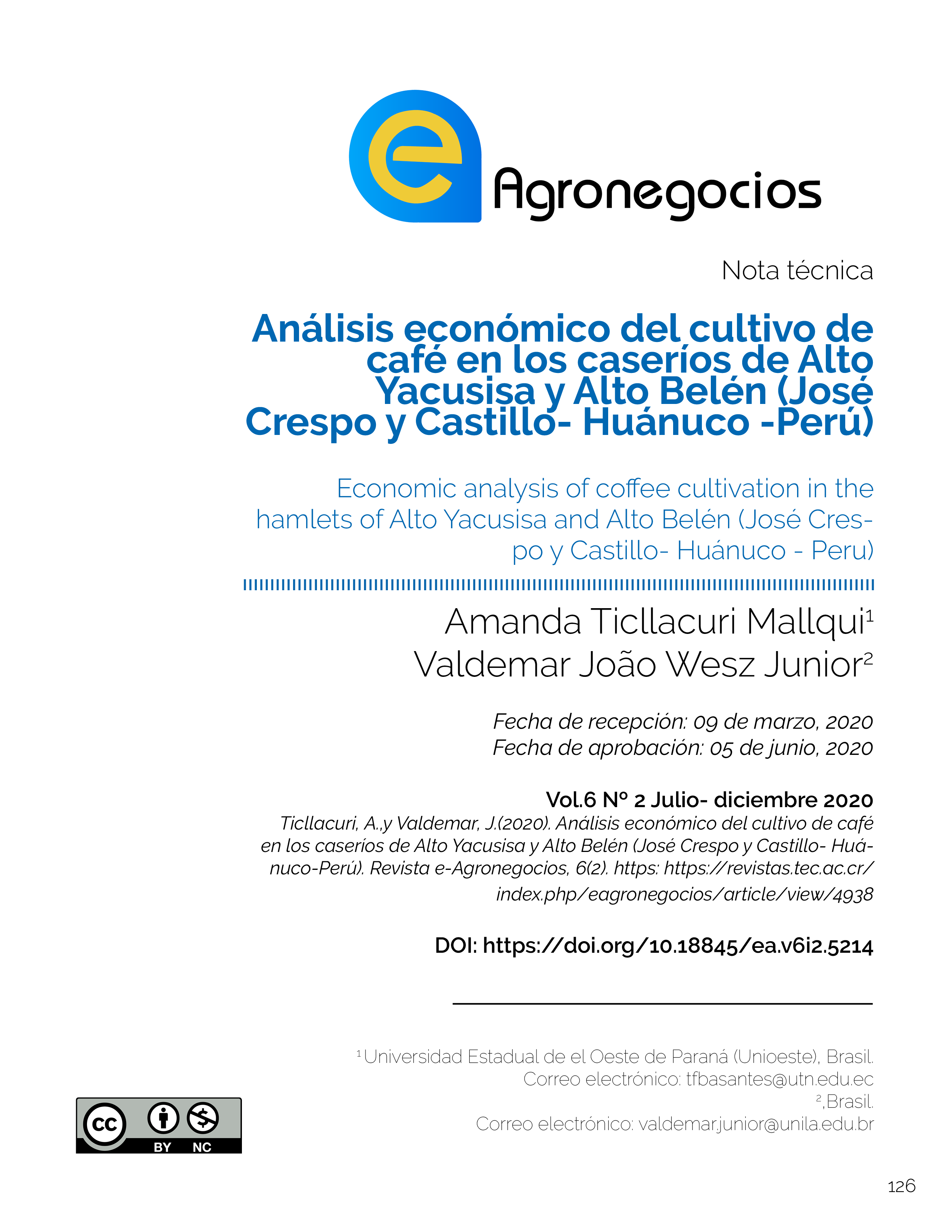Economic analysis of coffee cultivation in the hamlets of Alto Yacusisa and Alto Belén (José Crespo y Castillo - Huánuco - Peru)
Main Article Content
Abstract
Coffee is a crop that grew significantly over the decades in Peru, being even an alternative introduced more recently by the State to replace the illicit production of coca leaf. This was the situation that occurred in the hamlets of Alto Yacusisa and Alto Belén, district of José Crespo y Castillo, which belong to the Huánuco region (Peru). This work aims to perform the economic analysis of coffee cultivation in the hamlets of Alto Yacusisa and Alto Belén (District of José Crespo y Castillo, Huánuco, Peru), to measure the net revenue obtained by farmers with coffee production in 2018. For this work, in addition to the literature review and secondary data analysis, 10 coffee growers will be surveyed in each hamlet. As a result, a great variation of the profit per hectare is observed, being that 8 of the 20 producers are prejudiced in the activity. It is perceived that the fall in international coffee prices directly affects producers, in parallel to the high cost of production and low harvests. But, those who manage to contour this last point, are precisely those that obtained greater profit, as well as the producers industrialized their coffee and sold with an added value.
Article Details

This work is licensed under a Creative Commons Attribution-NonCommercial 4.0 International License.
Las personas autoras conservan los derechos de autor/a y ceden a la revista el derecho de la primera publicación y que pueda editarlo, reproducirlo, distribuirlo, exhibirlo y comunicarlo en el país y en el extranjero mediante medios impresos y electrónicos. Asimismo, las personas autoras asumen el compromiso sobre cualquier litigio o reclamación relacionada con derechos de propiedad intelectual, exonerando de responsabilidad a la Editorial Tecnológica de Costa Rica. Además, se establece que los autores pueden realizar otros acuerdos contractuales independientes y adicionales para la distribución no exclusiva de la versión del artículo publicado en esta revista (p. ej., incluirlo en un repositorio institucional o publicarlo en un libro) siempre que indiquen claramente que el trabajo se publicó por primera vez en esta revista.
References
Alania Campos, M. H. (2018). Estrutura de governança e mecanismos de coordenação em cadeias curtas de abastecimento alimentar: estudo de caso das organizações dedicadas ao café especial em Villa Rica-Pasco-Peru. Tesis en Desarrollo Rural. PGDR-UFRGS, Porto Alegre.
Becerra Biaggioni, K. (2010). Café de las nubes del Perú. Universidad San Martin de Porres: Fondo editorial.
Cahuapaza, J. (2016). Café orgánico, historia, contexto y perspectivas. Lima: Junta Nacional del Café.
Cámara Peruana de Café y Cacao. (2017). Estudio de mercado del café peruano. Lima: Proyecto café&clima.
Cárdenas, M. B; Cáceres, E. A; Aulla, F. C; García, G; Peña, E. (2017). Planeamiento Estratégico de los Productores de Café en la Región Junín. (Magíster en Administración Estratégica de Empresas). Pontificia Universidad Católica del Perú. Perú.
Castro, P. et al. Café de especialidad: alternativa para el sector cafetalero peruano. Journal of Economics, Finance and Administrative Science, año 9, n. 17, p. 61-84, 2004.
Conterato, M. A. (2014). O consumo intermediário na agricultura: uma comparação entre agricultura familiar e não familiar no Brasil e nas regiões Sul e Nordeste.Revista Econômica do Nordeste, v. 45, p. 133-162. Recuperado el 26-11-2019 de https://ren.emnuvens.com.br/ren/article/view/499/395
DRAH - Dirección Regional de Agricultura de Huánuco. (2019). Costos de producción. Recuperado el 16-10-2019 de http://www.huanucoagrario.gob.pe/index.php/2015-05-27-21-24-35/costos-de-produccion.
González V. E; Espinet C. G. R. (1980). Análisis económico de la producción de café al sol en Puerto Rico. Universidad de Puerto Rico. Puerto Rico.
Guerra, R. U. (1997). El cultivo de la coca en el Perú. In: IX Congreso Nacional de Ingenieros Agrónomos. Trujillo. Recuperado el 28-11-2019 de http://www4.congreso.gob.pe/congresista/1995/rurrelo/coca.htm.
INEI. (2013). IV Censo Nacional Agropecuario 2012. Recuperado el 25-11-2019 dehttp://censos.inei.gob.pe/Cenagro/redatam/#.
INEI. (2019). Estadísticas sectoriales - Agropecuario. Recuperado el 26-11-2019 de https://www.inei.gob.pe/estadisticas/indice-tematico/economia/.
INFOCAFES. Producción de Café en Perú.Recuperado el 02-12-2019 de http://infocafes.com/portal/infocafes/produccion-de-cafe-en-peru/.
La República. (2018). 90% de la producción del café peruano se exporta. Recuperado el 04-12-2019 de https://larepublica.pe/economia/1304887-90-produccion-cafe-peruano-exporta/.
Leiva-Espinoza, S. T.; Peña, A. R.; Rojas, K. B. R. Caracterización socioeconómica de la producción cafetalera en la provincia de Rodríguez de Mendoza (Amazonas, Perú). Revista de Investigación en Agroproducción Sustentable, v. 1, n. 3, p. 59-67, 2017.
MINAGRI. (2018). Una propuesta de política para una caficultura moderna, competitiva y sostenible. Lima: Fabrica de Ideas, 2018. Recuperado el 25-10-2019 de https://www.undp.org/content/dam/peru/docs/Publicaciones%20medio%20ambiente/PNA-Cafe%20(pliegos)%2018Oct2018%20(1).pdf.
MINAGRI. (2019). Cafés especiales en el Perú. Recuperado el 25-10-2019 de https://www.minagri.gob.pe/portal/especial-iv-cenagro/24-sector-agrario/cafe/204-cafes-especiales-en-el-peru.
Saldaña, T, J, K. (2019). Costos de producción y su incidencia en la rentabilidad del cultivo de café en Aspacoc, Jaen. (Bachiller en Contabilidad). Universidad Señor de Sipán, Perú.
Valera Ríos, K. Análisis de rentabilidad económica del cultivo de la Coca frente a cultivos alternativos (Cacao y Café) en el Distrito de José Crespo y Castillo. Tesis del Departamento Académico de Ciencias Económicas. UNAS, Tíngo Maria, 2010.
Weck, C. Et Al. Cooperativistas y el café nuestro de cada mañana. Medio Ambiente y Urbanización, n. 72, v. 1, p. 75-85, 2010.

